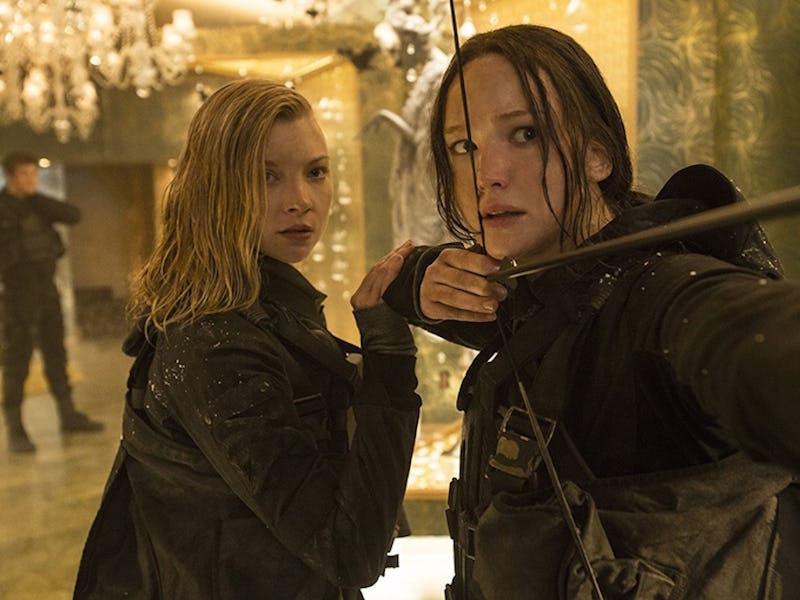Three Can't-Miss Choices for the Next 'Hunger Games'
Post 'Mockingjay Part 2,' studios should be hopping all over adaptations of 'Unwind,' 'The Claidi Journals,' and 'Uglies.'

After four movies, lots of bloodshed, countless sneers from Donald Sutherland, and Jennifer Lawrence’s eerie life-imitates-art rise as America’s real life Mockingjay, The Hunger Games’s reign over the box office is drawing to a close. Naturally, studios will be starving for the next copycat — but since YA dystopia is hot right now, discerning the good from the bad can be as difficult as choosing between Peeta and Gale (the choice should be obvious, Katniss: Cressida!) Here are three intelligent books with riveting plots and fully-realized worlds that would quench our hunger for more movies about fascist governments and teens in dire situations.
The Unwind series by Neal Shusterman
The premise: Think The Hunger Games meets Never Let Me Go. In the not-too-distant future, America has had a civil war between Pro-life and Pro-choice factions. The agreement they come to completely outlaws abortion — but during a kid’s teenage years, parents or authorities can have them harvested for organ donation. The powers that be rationalize this because they aren’t considered dead, they’re simply “unwound” and living “in a divided state.”
Why it’s better than The Hunger Games: Shusterman has clearly put a lot of thought into fleshing out every corner of this world, which makes his premise far sturdier. The Hunger Games, while a lot of fun, suffers from a flimsy premise, because it’s completely preposterous that society would go along with televised reality show child deathmatches and wait seventy five years before rebelling. Also, the district system just doesn’t seem economically sound. In other words, plot holes galore.
But the four books that make up the Unwind series have no plot holes — and do a better job exploring the intricacies of political propaganda — than The Hunger Games. Every time you think something sounds incredulous, Shusterman is a step ahead with an answer that feels chillingly plausible. For example, his shadowy pseudo government organization is called Proactive Citizenry — doesn’t that sound like a think-tank that would actually exist?
For savvy fans of Unwind, yes, a movie is in fact in the works, but it’s not from a major studio and this story deserves a Hunger Games sized budget to do it justice. But seeing how Hollywood has no problem with remakes and reboots that immediately follow one version of a film, this should be a nonissue.
The Claidi Journals by Tanith Lee
The Premise: Think The Hunger Games meets Mad Max meets Station Eleven meets The Village. In the vague future, America has become a desert wasteland and people live in disparate palace-cities, ignorant of the outside world. The heroine thinks nothing exists outside her palace-city, but surprise surprise, she finds out she’s been lied to and the outside world is not, in fact, an uninhabitable wasteland. Adventures ensue, filled with gypsies, automatons, and science experiments in jungles.
Why it’s better than The Hunger Games:
The future The Hunger Games projects is not always the most imaginative: color palates are heavy on grey and silver. It often looks like they went shopping in Pottery Barn’s Generic Future Aesthetic section.
Streamlined jumpsuits, holograms — cool, yes, but imaginative? Not quite. The Claidi Journals envisions a world that’s unique and colorful, mingling future aesthetic with a sort of steampunk Arabian Nights.
The Uglies series by Scott Westerfeld
The Premise: Think The Hunger Games meets The Giver meets the famous Twilight Zone episode, “Eye of the Beholder”. In future America, society has found a way to be peaceful forever: everyone undergoes mandatory plastic surgery at age sixteen that makes them beautiful. Once beautiful, they’re free to pursue lives of leisure while the government takes care of everything else out of sight. Obviously not everyone is down with conforming and shenanigans ensue.
Why it’s better than The Hunger Games: The society everyone lives in post-operation is actually pretty similar to the Capitol society in The Hunger Games. Unfortunately, eager to get back to the arena, The Hunger Games never lingers on it enough. Catching Fire spends the most time exploring it — and there’s a reason it’s widely considered to be the best.
That, and its introduction of the series two best characters, Johanna and Finnick. The Uglies series fleshes out a truly superficial future society, complete with plausible tech gadgets and future-Millennial lingo, and it lingers on the darker implications rather than speeding past them to get to some arena fights.
When a genre skyrockets to popularity as YA dystopia has, there are a lot of pretenders at the throne. Even so, there’s no need for Hollywood to grasp at whichever shiny one seems the most like The Hunger Games but has an even flimsier premise (not to point fingers, but Divergent and The Maze Runner). There are plenty of meaty, thoughtful premises out there with great stories, memorable characters, and names that are slightly less distractingly silly. With the proper casting, writing (Jonathan!), and directing, any of these stories could set the world on fire all over again.